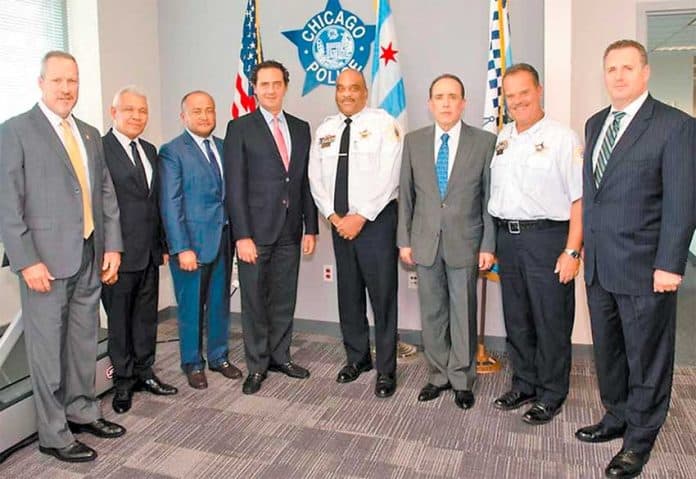Mexican and U.S. law enforcement authorities have announced new security strategies including the creation of a joint investigative team that will target the leaders and finances of Mexican cartels that ship drugs into the United States.
The team will be based in Chicago and made up of agents from the federal Attorney General’s office (PGR), the Federal Police, the United States Drug Enforcement Administration (DEA), the Federal Bureau of Investigation (FBI) and other Mexican and U.S. security forces.
At a press conference in Chicago yesterday, members of the Mexican government, military and Federal Police, flanked by DEA officials, said that one priority was the arrest of Nemesio “El Mencho” Oseguera Cervantes, leader of the increasingly powerful Jalisco New Generation Cartel (CJNG).
Mexico and the United States have both raised their rewards for any information that leads to Oseguera’s arrest.
Anthony Williams, chief of operations for the DEA, said that targeting cartels’ finances is crucial to stop the flow of drugs from Mexico into the United States.
“The sole purpose of these entities is one thing and one thing only — money,” he said.
The special agent of the DEA’s Chicago office, Brian McKnight, said the binational team will focus on carrying out international investigations that would go after “high value” targets.
“This is not a national problem. This is an international problem . . . A new era of law enforcement is upon us and we are coming for you,” he said.
McKnight also said that a new local task force will target gangs in Chicago, where Mexican cartels are believed to be partially responsible for high levels of drug-fueled violence on the city’s streets.
“We have a unique gang problem, and with that comes a unique violence problem with the guns associated with that,” said Chicago police Superintendent Eddie Johnson.
“We also know that cartels in Mexico are responsible for much of the illegal drugs that are finding their way to Chicago,” he added.
Felipe de Jesús Muñoz Vázquez, head of the PGR’s federal crimes investigation unit, said the team will seek “to break the value chains of [criminal] organizations such as the market routes for drugs and weapons.”
In a statement, the PGR said the two countries had reached “unprecedented strategic agreements” whose aim is to “weaken all the points of criminal groups, based on more effective and immediate actions.”
Acting Attorney General Alberto Elías Beltran, who also traveled to Chicago, told Fox News that “we have to find a way to debilitate their [cartel’s] financial structures,” charging “that way they won’t have the capabilities to ship the drugs to the United States and they won’t be able to bring guns and money back to Mexico.”
While the new security plans place greater emphasis on attacking cartels’ finances and establish the binational investigative team, the Associated Press reported that they “don’t include major departures from how both countries have gone after cartels for years.”
However, the director of the DEA’s North and Central American Region said Tuesday that the United States also wants to rely more on recent changes made to the Mexican legal system that were designed to make evidence gathering and prosecutions more efficient.
“That’s what we’re really trying to push — the cooperation that we currently have with Mexico to be a little more efficient, a little bit more aggressive,” Matthew G. Donahue said.
In exchange, he said the United States intended to do more to stop the illegal flow of weapons into Mexico, which Interior Secretary Alfonso Navarrete Prida last month said largely fueled the high levels of violence in the country.
The arrest and extradition of former Sinaloa Cartel head Joaquín “El Chapo” Guzmán also “dramatically reshaped the landscape of Mexican organized crime,” according to a 2018 report by the University of San Diego’s Justice in Mexico research initiative, creating a power vacuum that has helped the CJNG to increase its power.
Yesterday’s announcement of the binational team and the “kingpin strategy” targeting high level cartel leaders “didn’t sound that new in terms of the main policy proposals,” according to a security studies professor at Sam Houston State University in Texas.
Nathan Jones told broadcaster NBC that “it seems they were maybe trying to lock in a new way to speed up prosecutions of Mexican nationals and extradite them faster” before new president Andrés Manuel López Obrador is sworn in on December 1.
“I’m interested in the timing,” he said.
The strengthening of the joint security strategy comes at a time when bilateral relations between Mexico and the United States are strained, largely due to U.S. President Donald Trump’s hardline policy positions on immigration and trade and his border wall.
Mexican President Enrique Peña Nieto rebuked Trump in a video posted to social media in April, urging him to vent his frustrations on the United States Congress rather than Mexico.
However, some cartel experts say that the deterioration of the relationship at the presidential level hasn’t undermined cooperation on the fight against drug cartels at the law enforcement level.
In March, the governments of Mexico and the United States also agreed to cooperate on a broad-reaching maritime operation to combat the drug trade.
Both López Obrador and Trump have publicly declared they want to improve two-way ties but the former has also said that he plans to make significant changes to Mexico’s domestic security strategy, including gradually withdrawing the military from public security tasks and possibly legalizing some drugs and implementing an amnesty law.
Alfonso Durazo, tapped to be secretary of public security in the new government, has said that all cooperation pacts with neighbors will be reviewed.
However, today he indicated that the incoming administration will support one aspect of the strategy more than another, stating “it will be more important to go after drug trafficking money than the drug traffickers themselves” because what gives them the capacity to operate are not the cartel leaders but their financial resources.
Source: Milenio (sp), NBC News (en), Associated Press (en)
